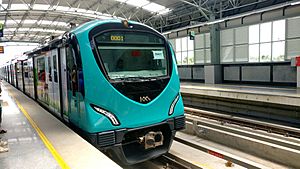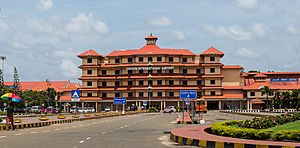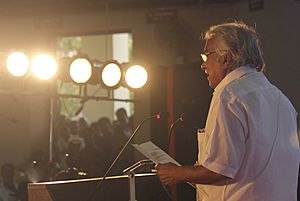Oommen Chandy facts for kids
Quick facts for kids
Oommen Chandy
|
|
|---|---|
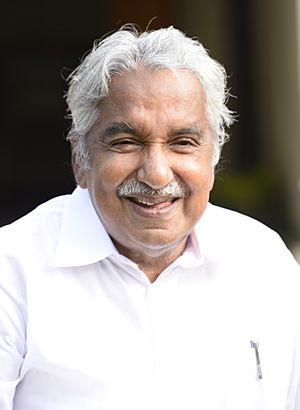 |
|
| 10th Chief Minister of Kerala | |
| In office 18 May 2011 – 20 May 2016 |
|
| Governor |
|
| Preceded by | V. S. Achuthanandan |
| Succeeded by | Pinarayi Vijayan |
| In office 31 August 2004 – 12 May 2006 |
|
| Governor | R. L. Bhatia |
| Preceded by | A. K. Antony |
| Succeeded by | V. S. Achuthanandan |
| Member of the Kerala Legislative Assembly | |
| In office 1970–2023 |
|
| Preceded by | E. M. George |
| Constituency | Puthuppally |
| Minister of Home Affairs, Government of Kerala | |
| In office 18 May 2011 – 13 April 2012 |
|
| Chief Minister | Himself |
| Preceded by | Kodiyeri Balakrishnan |
| Succeeded by | Thiruvanchoor Radhakrishnan |
| In office 31 August 2004 – 12 May 2006 |
|
| Chief Minister | Himself |
| Preceded by | A. K. Antony |
| Succeeded by | Kodiyeri Balakrishnan |
| In office 28 December 1981 – 17 March 1982 |
|
| Chief Minister | K. Karunakaran |
| Preceded by | T. K. Ramakrishnan |
| Succeeded by | Vayalar Ravi |
| Minister for Finance, Government of Kerala | |
| In office 10 November 2015 – 20 May 2016 |
|
| Chief Minister | Himself |
| Preceded by | K. M. Mani |
| Succeeded by | T. M. Thomas Isaac |
| In office 2 July 1991 – 22 June 1994 |
|
| Chief Minister | K. Karunakaran |
| Preceded by | V. Viswanatha Menon |
| Succeeded by | C. V. Padmarajan |
| Leader of the Opposition, Kerala Legislative Assembly |
|
| In office 18 May 2006 – 14 May 2011 |
|
| Governor | |
| Preceded by | V. S. Achuthanandan |
| Succeeded by | V. S. Achuthanandan |
| General Secretary of the AICC for Andhra Pradesh | |
| In office 6 June 2018 – 18 July 2023 |
|
| President |
|
| Personal details | |
| Born | 31 October 1943 Puthuppally, Kingdom of Travancore, British India (present day Kottayam, Kerala, India) |
| Died | 18 July 2023 (aged 79) Bengaluru, Karnataka, India |
| Political party | Indian National Congress |
| Spouse | Mariamma Oommen |
| Children | 3 |
| Residences |
|
| Alma mater |
|
|
As of 9 April 2014
Source: [1] |
|
Oommen Chandy (born October 31, 1943 – died July 18, 2023) was an important political leader from Kerala, India. He served as the chief minister of Kerala twice. His first term was from 2004 to 2006, and his second was from 2011 to 2016. He also led the opposition party in the Kerala Legislative Assembly from 2006 to 2011.
Chandy represented the Puthuppally constituency as a Member of the Legislative Assembly (MLA). He held this position from 1970 until his death in 2023. This made him the longest-serving MLA in any state legislature in India. In 2013, he received an award for public service from the United Nations.
In 2018, he was appointed as the general secretary of the All India Congress Committee. He was in charge of the state of Andhra Pradesh. He was also a member of the Congress Working Committee when he passed away.
Contents
Early Life and Education
Oommen Chandy was born on October 31, 1943, in Puthuppally, which is in the Kottayam district. He started his political journey as an activist for the Kerala Students Union (KSU). This was a student group linked to the Indian National Congress party.
He was the president of the KSU at St. George High School, Puthupally. Later, he became the state president of the entire organization. Chandy studied at CMS College, Kottayam and then at St. Berchmans College, Changanassery. He earned a Bachelor of Arts (B.A.) degree in Economics. He later studied law and received a Bachelor of Laws (LL.B) degree from the Government Law College, Ernakulam.
Political Career
Chandy began his political career with the Kerala Students Union (KSU). He served as its president from 1967 to 1969. In 1970, he was elected as the president of the State Youth Congress.
He represented the Puthuppally constituency for over 50 years. He was elected to the Kerala Legislative Assembly many times, starting in 1970. During his time as an MLA, he also led the Public Accounts Committee from 1996 to 1998.
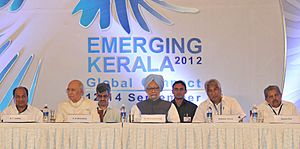
Serving as a Minister
Oommen Chandy served as a minister in the Government of Kerala four times. He was the Minister for Labour in 1977 and 1978. From 1981 to 1982, he was in charge of the Home department. He became the Minister for Finance in 1991. He resigned from this role in 1994.
First Term as Chief Minister (2004–2006)
In May 2004, the Indian National Congress party did not win any seats in Kerala during the parliamentary elections. Because of this, the chief minister at the time, A.K. Antony, resigned. On August 30, 2004, Oommen Chandy was chosen as the new leader of the Congress party in the state assembly. He became the chief minister.
His party lost the 2006 Assembly Elections, so he resigned on May 12, 2006.
Leader of the Opposition (2006–2011)
After his first term as chief minister, Chandy became the leader of the opposition in the Kerala Legislative Assembly. Under his leadership, the UDF party won many seats in the 2009 Lok Sabha Election. They won 16 out of 20 parliament seats in Kerala. The UDF also did well in local elections.
Second Term as Chief Minister (2011–2016)
In the 2011 assembly election, Chandy's UDF party won by a small number of seats. They won 72 seats, while the LDF won 68. He took his oath as chief minister on May 18, 2011, along with six other ministers. Later, more ministers joined his cabinet.
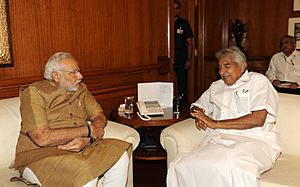
Awards and Honours
Oommen Chandy received the 2013 United Nations Public Service Award. This award was for his work in "Preventing and Combating Corruption in the Public Service" in the Asia-Pacific region. He received the award on June 27, 2013, in Manama, Bahrain. The award recognized his efforts in using technology and new ideas to improve public services.
Key Achievements
Chandy's first term as chief minister (2004–2006) focused on quick progress. His government introduced unemployment benefits and welfare programs for workers. He also attended the World Economic Forum in 2006.
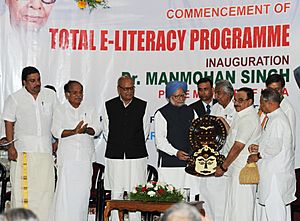
During his second term (2011–2016), his motto was "Development and Care." His government started many big projects and social welfare programs.
- Health and Welfare: The Karunya scheme helped patients with serious illnesses get free treatment. Many cochlear implant surgeries were done for children with hearing problems. More organ transplant surgeries were also performed. Chandy's "Mass Contact Programme" helped citizens get their complaints heard and solved.
- Education and Technology: In 2005, Information Technology became a required subject for school students in Kerala. This made Kerala the first Indian state to do so. Victers TV, India's first educational TV channel for schools, was launched in 2005. The Technopark in Thiruvananthapuram became India's largest IT park in 2014. New phases of InfoPark, Kochi and InfoPark Thrissur were also opened.
- Infrastructure: Many large projects began during his time. These included the Kannur International Airport, the Kochi Metro, and the Vizhinjam International Seaport in Thiruvananthapuram. Projects for the Thiruvananthapuram Light Metro and Kozhikode Light Metro were approved. The Hill Highway project, which connects hilly areas, was approved in 2005. The Kochi-Mangalore GAIL pipeline was also started.
- Local Governance: His government created 12 new Taluks and 28 new Municipalities. The Kannur Municipal Corporation was also formed. This helped with better local administration.
- Roads and Transport: Many new road bridges were built across Kerala. Decisions were made to widen national highways. The Kozhikode bypass was finished, and work on the Kollam Bypass and Alappuzha Bypass restarted. The Kerala Urban Road Transport Corporation (KURTC) was formed in 2015 to manage city transport.
- Higher Education: New medical colleges were opened in the state. The National University of Advanced Legal Studies in Kochi was founded in 2005. The Indian Institute of Technology in Palakkad was established in 2015. New universities like the Thunchath Ezhuthachan Malayalam University and APJ Abdul Kalam Technological University were also started.
- Green Initiatives: In 2015, the Cochin International Airport became the world's first airport to be fully powered by solar energy. It later won the "Champion of the Earth" award from the United Nations.
- Social Support: Social welfare pensions were doubled, helping many more people. Free food was given to those in need, and food kits were distributed during festivals. A subsidy was given to rubber farmers to ensure fair prices. The Kerala Public Service Commission filled many job vacancies, setting a record. Kerala was declared the first complete digital state of India in 2016.
The Emerging Kerala summit in 2012 showcased investment opportunities in the state. Many projects were planned after this event.
Death
Oommen Chandy passed away in a private hospital in Bengaluru on July 18, 2023. He was 79 years old and died from complications related to throat cancer.
|
 | Leon Lynch |
 | Milton P. Webster |
 | Ferdinand Smith |


